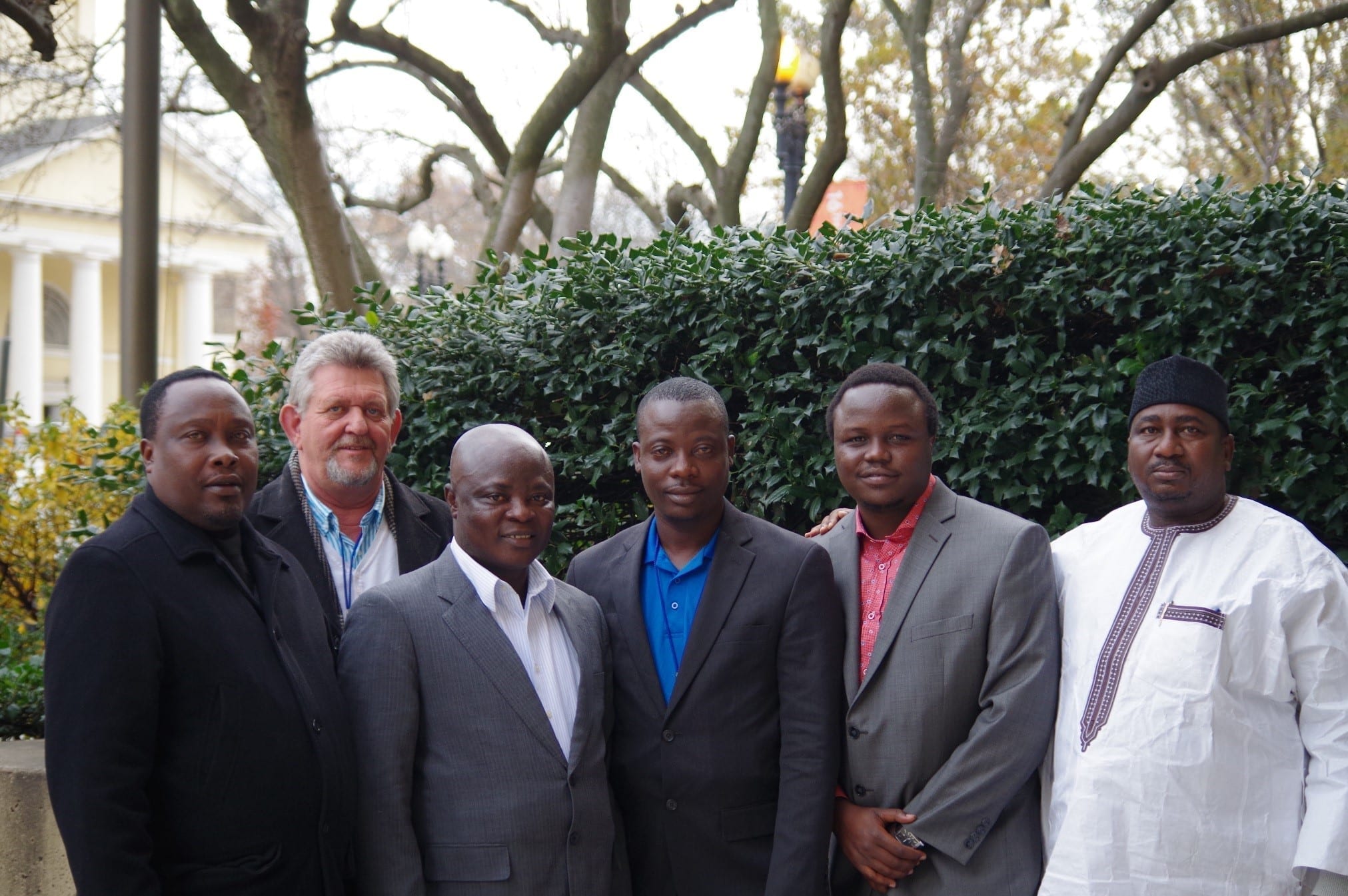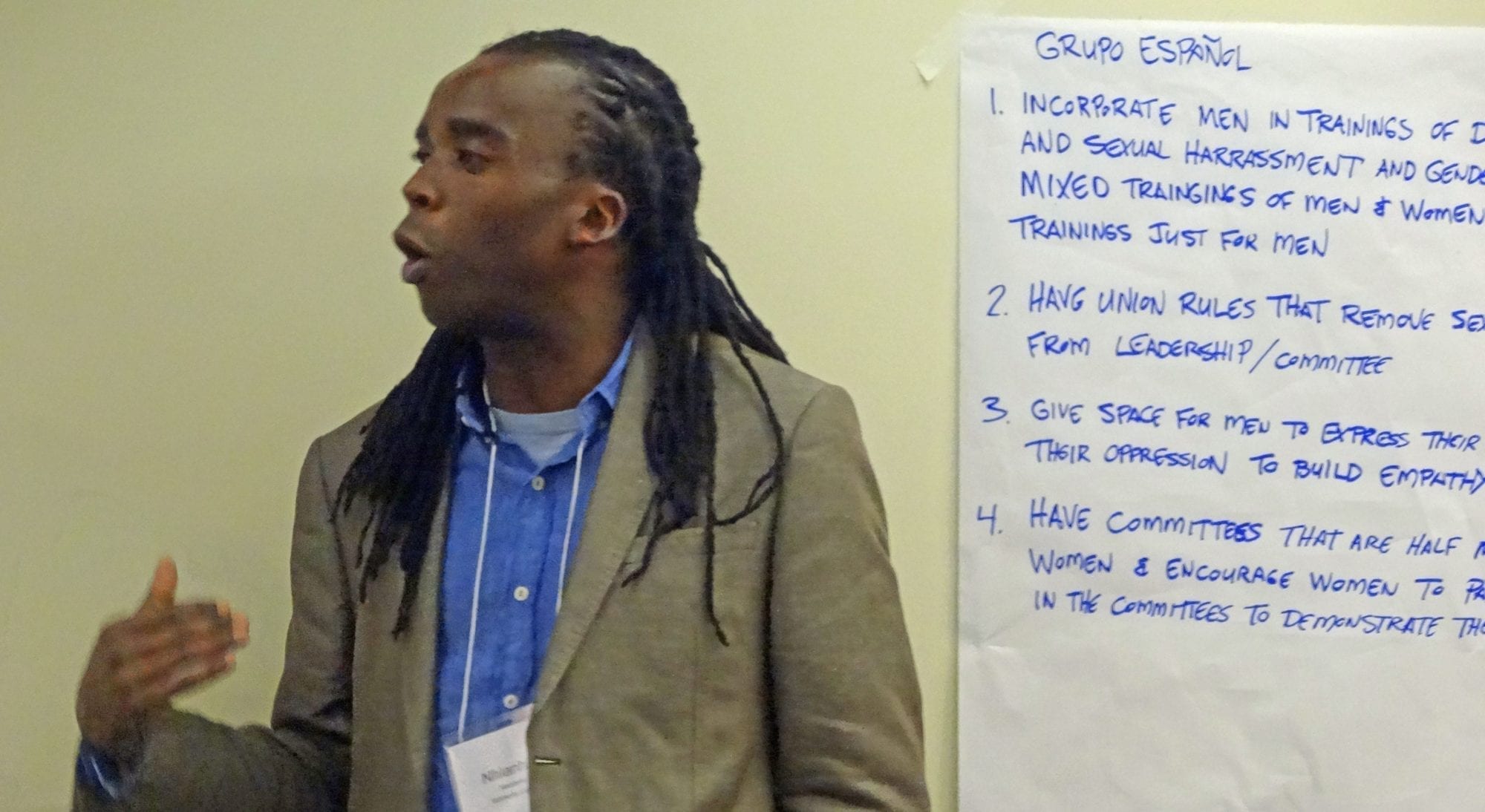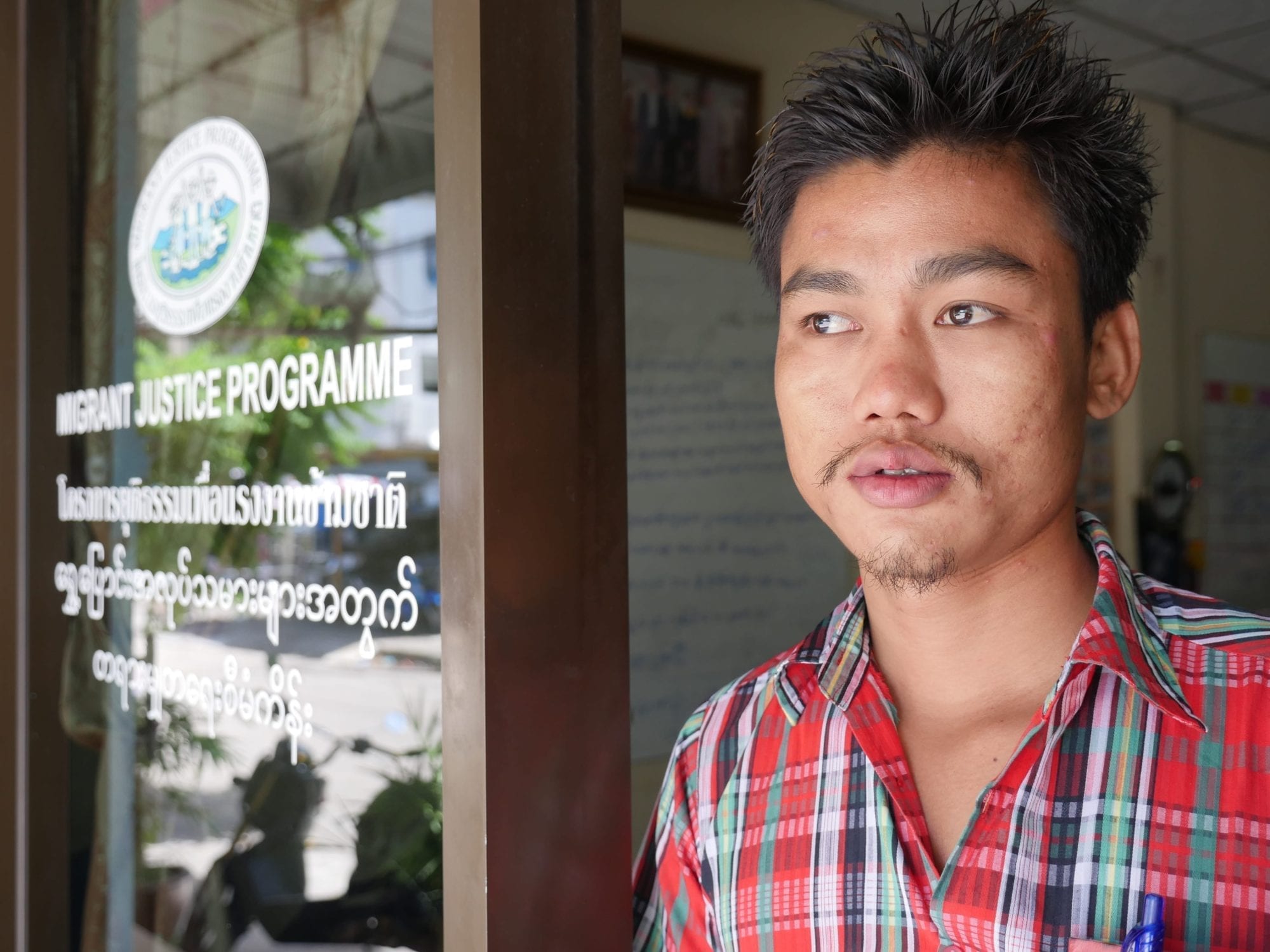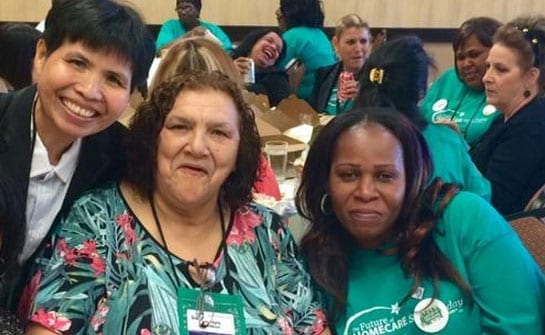
Dec 10, 2015
Addressing unemployment and underemployment, especially for young workers, is the most pressing issue for trade unions across Africa, according to participants in an African Labor Leaders Exchange Program sponsored by the Solidarity Center.
Speaking at a December 9 panel discussion at the AFL-CIO in Washington, D.C., six union leaders from Kenya, Liberia, Nigeria and South Africa discussed the challenges in securing economic prosperity for working people—and their strategies for empowering workers in the formal and informal economies.
“What faces us is high levels of unemployment, poverty,” said Edward de Klerk, deputy general secretary of South Africa’s United National Transport Union (UNTU).
“Unemployment is an African issue,” said Philip Kwoba, director of Youth Organizing with the Central Organization of Trade Unions (COTU) in Kenya. Unions in Kenya are reaching out to informal economy workers, which include many young workers, helping them form worker savings associations as a step toward unionization and gaining bargaining rights. “We are allocating resources to help,” said Kwoba.
Members of the panel, moderated by Solidarity Center Regional Program Director for Africa Imani Countess, said poverty also is fueled by low wages. “Wage inequality is this battle still we have got,” said de Klerk. In Nigeria, unions are tackling wage issues by addressing government policies that reduce the pay of public-employees, including teachers, said Muhammed Nasir Idris, National Treasurer Nigeria Union of Teachers (NUT).
Lack of employment opportunity and poverty in Liberia puts youth at risk of labor trafficking within the country’s borders, said Liberia Labor Congress (LLC) General Secretary David Sackoh.
Sackoh said labor recruiters take children from parents in their villages, promising the children will go to school in the city. Instead, the children are used in forced labor. “Even though our research shows (the children) want to return,” they are unable to do so for seven to 10 years,” he said.
Sackoh pointed to the Liberian trade union movement’s tremendous victory in eradicating child labor at the Firestone Natural Rubber Liberia plantation, and said the union movement now is working to address the issue at the seven other plantations across the country.
During questions with the audience, which included a packed crowd of union activists, policy experts and international experts, union leaders also discussed drawing more women into trade union leadership.
“Getting women elected to high offices is now on the union agenda,” said Boniface Kavuvi, general secretary of the Kenya Union of Commercial, Food and Allied Workers (KUCFAW). Kavuvi pointed to domestic workers in Kenya, represented by KUDHEIHA, as an example of dynamic organizing and strong leadership by women in Kenya. “They have done a tremendous job,” he said.
In Liberia, unions are pushing for 30 percent representation by women in union leadership, mirroring the country’s effort to increase women’s representation in the national legislature, said Isaac Grant, LLC organizing coordinator.
The six union leaders traveled to the United States for a South–South labor leaders’ exchange in which African labor leaders met with community and trade union organizers across the southern United States. The Solidarity Center worked with the U.S.-based labor education program, the National Labor Leadership Initiative (NLLI), to facilitate the exchange, sponsored by the U.S. Department of State’s Bureau of Educational and Cultural Affairs.

Oct 30, 2015
Nhlanhla Mabizela says he first truly grasped the meaning of gender inequality on a winter day in the dusty streets of Alexandra Township in post-apartheid South Africa.
Cutting through an alley surrounded by houses made of iron scrap and plastic sheets, Mabizela and a friend came across a group of children playing. All were barefoot in the cold, with a single layer of clothes he assumed were the only ones they owned.
“Guess the first thing that popped in our minds?” asks Mabizela, Solidarity Center program officer for gender. “Where are the mothers of these children?” Seconds later, he and his friend encountered groups of men sitting around a fire, drinking and laughing. Nearby, they also saw a woman doing laundry in a large corrugated bathtub, her hands immersed in icy water.
“There and then we had the answer to our question and a new one was born and it was, ‘What is happening in the mens’ minds?’ That was the day when it dawned on me that gender inequality is alive and some of us are quite comfortable with it.”
Solidarity Center Helps Unions Put Gender Equality into Practice
Solidarity Center programs around the world address gender inequality at the workplace and within unions and society. In South Africa, Mabizela holds trainings to empower women to join unions and take leadership roles and advocate for themselves and their families. Crucially, his workshops also focus on helping men understand cultural expectations and how those assumptions shape male leadership roles that are based on excluding women.
Mabizela’s work highlights a frequent dichotomy. Unions are key drivers in advancing gender equality. Yet in many countries around the world, there is a disconnect between labor union policy and practice in transforming gender inequalities within their own structures. Through the lens of the South African union movement, a new report commissioned by the Solidarity Center explores the disconnect and examines new strategies for closing the gap between policy and practice.
“Putting Union Gender Equality into Practice: The Role of Transformational Leadership” describes how “feminist leadership” can be encouraged within the South African trade union context in part by creating a democratic organizational culture and an environment that supports women workers in their struggle for emancipation and assists men to free themselves from patriarchal forms of power.
“We have internalized and institutionalized gender roles and the division of labor,” says Mabizela. “We have failed as a country to interrogate patriarchy and hence we will move four steps forward and six steps backwards. We are so immersed in the debates about political power at the expense of all the other oppressions in sexism.”
‘Everything Is Structured around Men’
South African unions and federations long have sought to redefine and reshape patriarchal structures, cultures and practices to better inhere gender equality. Beginning in 2005, several South African unions sought to develop alternative models of power after recognizing that male-dominated, hierarchical, union culture does not easily address such issues as violence against women and sexual harassment of women within the union. They took part in Gender at Work’s South African Gender Action Learning Program to employ gender-inclusive and accountable power building and power sharing.
Authors of the new study interviewed the men who took part, and reported that they expressed an appreciation of how, by challenging male stereotyped behaviors and aspects of patriarchal power relations, they have enriched their private and public relationships and strengthened their commitment to gender equality.
“The much broader question is the need to look at how male culture influences everything—how everything is structured around men,” says John Apollis, a leader from the General Industrial Workers Union (GIWUSA) who is quoted in the report. “We need a fundamental reorganization of the union otherwise we are not going to get far with breaking male dominance.”
Some of the men also noted they struggle with alienation by their peers, who see their efforts to incorporate gender equality in the union and at home as setting them apart from traditional male roles.
‘I Would Not Like to Rehash What Our Fathers Did’
Mabizela says he was aware of gender inequality even in childhood, when the girls would “disappear” after school to wash dishes or clean house, while the boys played outside.
But the winter day in Alexandria Township spurred him to “reflect on how easy it was for us (me and my friend) both men, to put the burden of care squarely on women’s shoulders and be oblivious to the effects of gender-based violence. That day still exists in many parts of this world and not only in shanty towns of South Africa, but also in the leafy suburbs of the affluent.”
As Solidarity Center gender program officer, Mabizela also works with other organizations to campaign for passage of national laws, like a minimum wage for South Africa’s 1 million domestic workers which became law last December. Parliament currently is considering an expanded maternity leave law that incorporates significant input by the Solidarity Center.
He works with four South African union federations on the International Trade Union Confederation’s Labor Rights for Women Campaign and assists federations in developing sexual harassment policies and gender policies. He brings to his work experience as a peer educator for me at Planned Parenthood of South Africa and as a program officer for EngenderHealth’s Men as Partners Program.
In striving to embody the change essential for advancing gender equality in South Africa, Mabizela is blazing a trail for others. When describing the influences that motivate his work, Mabizela says he often thinks about how much he yearned to have a father in his life when he was a child—an experience he later learned was not uncommon.
Now, as the father of an 11-year-old son, Mabizela says, “the thought that I would not like to rehash what our fathers did, motivates me to do the work that I do. Observing my son grow, and developing confidence and not being afraid to show his emotions—it is enough motivation to carry on for his sake and the betterment of our societies.”

Aug 9, 2015
Human rights lawyer Preeda Tongcumnum is among the more than 200 migrant worker advocates gathering in Bogar, Indonesia, this week to take part in the Solidarity Center labor migration conference. As assistant to the secretary general at the Human Rights and Development Foundation (HRDF), Tongcumnum helps migrant workers in Thailand understand their legal rights and advocates for policies that support migrant workers.
Another conference participant, Jane Barrett, affiliate support coordinator at the Congress of South African Trade Unions (COSATU), heads up a network of unions and worker associations that coordinate organizing and support for informal economy workers, including migrant workers. Barrett plans to “share some of our fledgling attempts and thinking around organizing migrant workers and to learn from other successful examples.”
Traveling from the United States, where he organizes a largely migrant workforce, Pablo Alvarado, executive director of the National Day Labor Organizing Network (NDLON), also is joining the August 10–12 event, Labor Migration: Who Benefits? A Solidarity Center Conference on Worker Rights & Shared Prosperity.
Tongcumnum, Barrett and Alvarado offer a glimpse of the broad range of migrant worker activists who are bringing their diverse experiences, challenges and successes together for three days to achieve one goal: empowering migrant workers.
They will share strategies on organizing migrant workers, reforming the labor recruitment process and ensuring migrant worker access to justice.
They will address xenophobia and gender equality, and they will take time to celebrate their victories: Members of the International Domestic Workers Federation (IDWF) will mark achievements like the 2011 passage of an International Labor Organization convention stipulating rights of domestic workers, many who are migrants, and the formation of the organization which unites domestic workers from around the world.
Get facts about migrant workers and follow the events on our website and on Twitter @SolidarityCntr.

Apr 3, 2015
Myrtle Witbooi spent decades toiling as a domestic worker in South Africa and later built on her experience to become a national and global leader for domestic worker rights.
Now general secretary of the South African Domestic Service and Allied Workers Union (SADSAWU) and the first president of the International Domestic Workers Federation (IDWF), Witbooi says IDWF’s goals involve outreach to countries that do not have laws covering domestic workers and determining “how can we empower domestic workers to speak up for themselves, how can we empower domestic workers to form their own organizations and defy those who stand in their way.”
Witbooi made her comments in an interview on the Africa Today radio program in Sacramento, California, where she was participating in the United Domestic Workers of America/AFSCME convention. She and other domestic workers and advocates from around the world met with U.S. homecare workers last month as part of the Solidarity Center’s Multi-Regional Exchange for Domestic Worker and Migrant Worker Rights Activists and Leaders.
In connecting with U.S. homecare workers, Witbooi sought to put in play a fundamental union principle: strength through solidarity. “United, we can speak in one voice and in one language and that’s why we can win many more things for domestic workers,” she says.
In the interview, Witbooi offers an overview of the struggle by South Africa’s domestic workers to gain the same rights and protections as other workers. At one point, domestic workers chained themselves to the Parliament gates, one of a series of ongoing actions that resulted in the nation’s 2002 labor law covering domestic workers. Domestic workers went on to win unemployment compensation and a minimum wage.
Witbooi proudly says the global federation, formed in 2012, is “run by and controlled by women,” and notes its goals involve “forming organizations to empower women to be able to speak out for themselves.”
“To be able to say, ‘This is my right and I demand that you respect me as a woman and also my work is decent work and I want decent pay.’ ”
Listen to the full interview here (beginning at 19:54).
Oct 22, 2014
In Limpopo, a landlocked rural area in South Africa’s northernmost province, agriculture and mining are the primary industries, nearly 75 percent of residents fall below the country’s poverty line and many cling to long-held cultural and religious biases. In this difficult environment, workers who identify as LGBTI (lesbian, gay, bisexual, transgender and intersex) face frequent discrimination at the workplace, even though it is prohibited under the South African Constitution.
“Discrimination is bad—employers want us to dress a certain way, they want us to pretend to be what we are not,” said one young lesbian member of the Limpopo LGBTI group, Proudly Out. “I am seen as a demon.”
The worker was among 60 participants in a recent dialogue session, “LGBTI Rights in the Workplace,” organized by WageIndicator.org sponsors, the Solidarity Center, the Labour Rights for Women and others.
The discussion in Polokwane, Limpopo’s capital, included LGBTI workers and union leaders from South Africa’s four labor federations: the Congress of South African Trade Unions (COSATU), the National Council of Trade Unions (NACTU), the Confederation of South Africa Workers’ Unions (CONSAWU) and the Federation of Unions of South Africa (FEDUSA).
Members of the LGBTI community spoke of not being taken seriously in interviews for jobs because they did not look “conventional.” Some said they were prohibited by their employer from taking time off work to care for a partner, a right guaranteed under the country’s Family Responsibility Leave policy. Others described being called names and being shunned by colleagues in spaces such as workplace bathrooms.
The low level of information about the LGBTI community in Limpopo results in prejudice and makes it difficult for LGBTI workers to access their constitutional rights in the province and in their respective communities, according to Nhlanhla Mabizela, Solidarity Center program officer for gender in South Africa.
Further, some members of the LGBTI community, particularly those in rural areas, do not know how to access their rights, according to a representative of the South African Commission for Gender Equality who also took part in the forum, along with the Labour Research Service.
The meeting also highlighted the need for more awareness among unions about the struggles of LGBTI workers so they could effectively stand up for LGBTI issues at work. Federation leaders agreed to hold similar LGBTI education and dialogue meetings with their local unions to help ensure LGBTI rights were recognized at the workplace and during contract negotiations.
The meeting in Limpopo is the third such LGBTI dialogue spearheaded by the WageIndicator.org’s Labour Rights for Women campaign in South Africa, as it works with trade unions and other civil society organizations to reverse the conditions that led one LGBTI participant to say: “We are hated for being who we are.”





